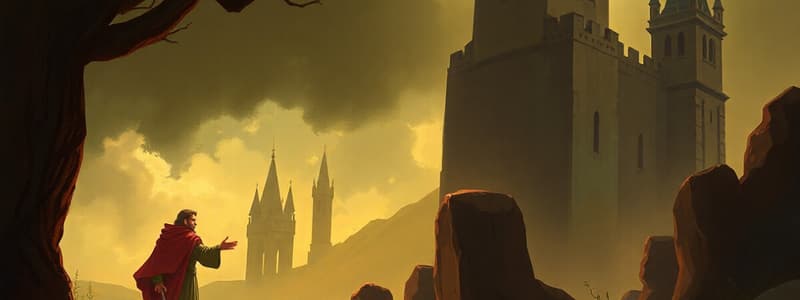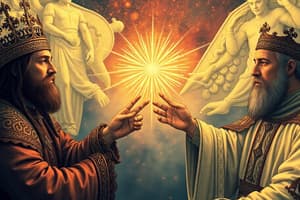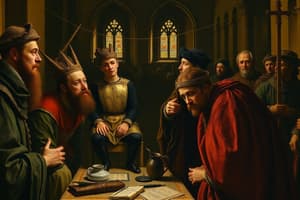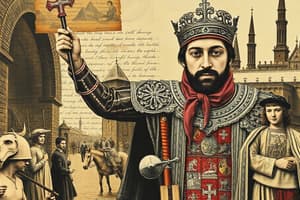Podcast
Questions and Answers
What is the main concern of the Chorus regarding Becket's return to Canterbury?
What is the main concern of the Chorus regarding Becket's return to Canterbury?
- They want him to take a more political approach as Archbishop.
- They believe Becket will bring wealth to the congregation.
- They fear his return will lead to his death and their own turmoil. (correct)
- They think he will abandon his religious duties.
What role do the four tempters play in Becket's return to Canterbury?
What role do the four tempters play in Becket's return to Canterbury?
- They seek to convince Becket to leave Canterbury again.
- They are loyal supporters of Becket's spiritual mission.
- They assist Becket in strengthening his political power.
- They represent various earthly desires and temptations for Becket. (correct)
What significant decision does Becket ultimately make regarding his fate?
What significant decision does Becket ultimately make regarding his fate?
- He decides to return to France to avoid conflict.
- He accepts martyrdom as his fate in devotion to God. (correct)
- He chooses to pursue political power over religious duties.
- He plans to confront King Henry II about their conflicts.
How long had Becket been away from Canterbury before his return?
How long had Becket been away from Canterbury before his return?
Which group of characters welcomes Becket back to Canterbury?
Which group of characters welcomes Becket back to Canterbury?
Flashcards are hidden until you start studying
Study Notes
Chorus and Becket's Absence
- The play begins with the Chorus, a group of Canterbury women, lamenting the Archbishop's seven-year absence.
- Becket's absence stems from conflicts with King Henry II, involving religious and political issues.
- While the Chorus misses Becket, they fear his return due to the potential for renewed conflicts and his possible death.
Becket's Return and Welcome
- A herald announces Becket's arrival from France, causing dismay among the Chorus who anticipate his death as a consequence.
- Three priests who previously served Becket welcome him back to Canterbury.
- Becket's entry into the scene is followed by the appearance of four tempters, individuals seeking to influence his perspective on power.
Temptation and Martyrdom
- The four tempters present Becket with various proposals for how to balance his religious authority with political power.
- Becket rejects all temptations believing their visions for his future are not aligned with God's plan.
- Becket embraces martyrdom as his fate, choosing to sacrifice his life in devotion to God.
Key Themes
- The play explores the complex relationship between religious and political authority and the impact of ambition and power.
- It examines themes of faith, sacrifice, and the challenges of navigating conflicting ideologies.
Studying That Suits You
Use AI to generate personalized quizzes and flashcards to suit your learning preferences.




